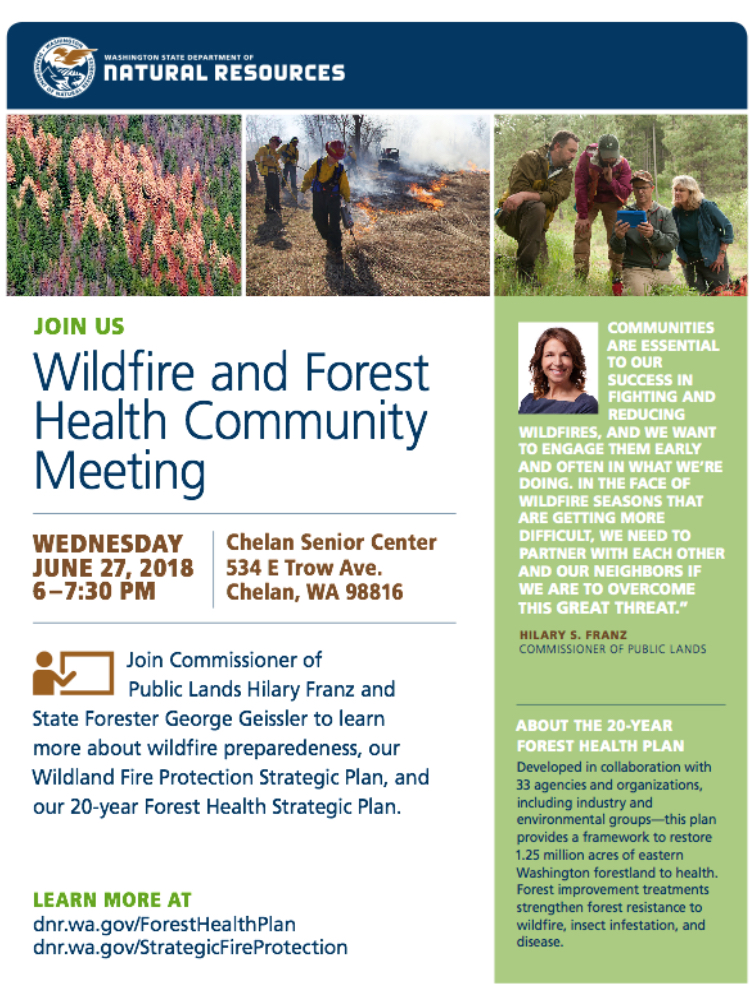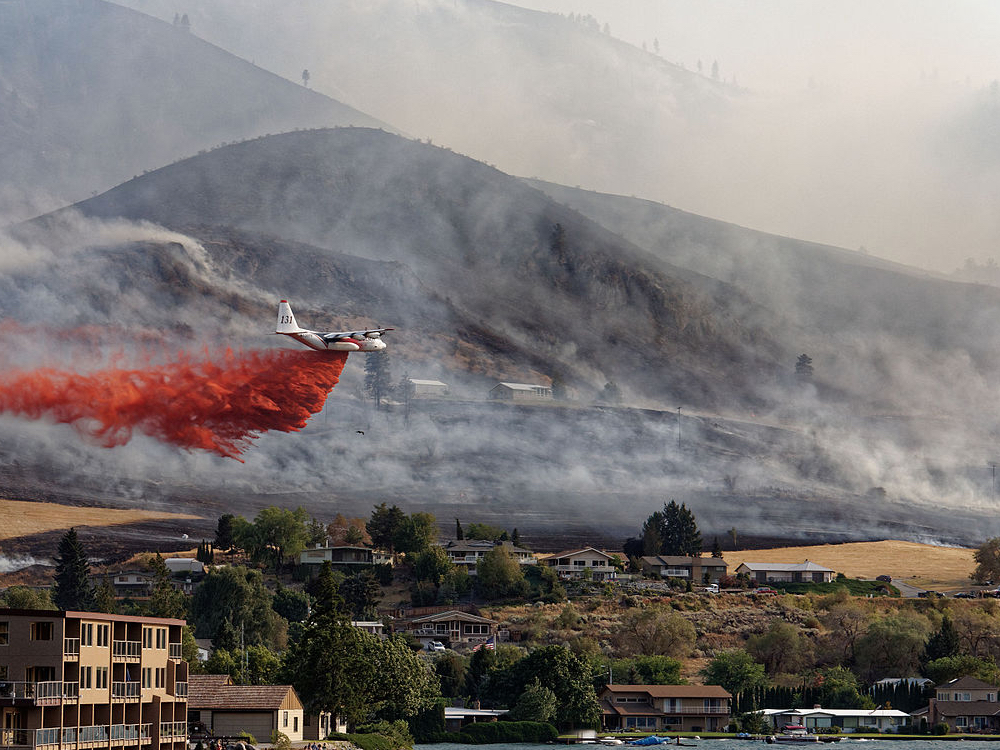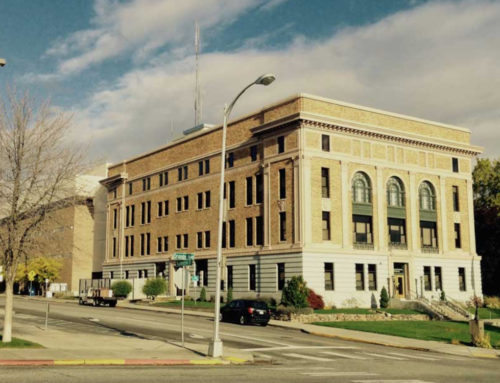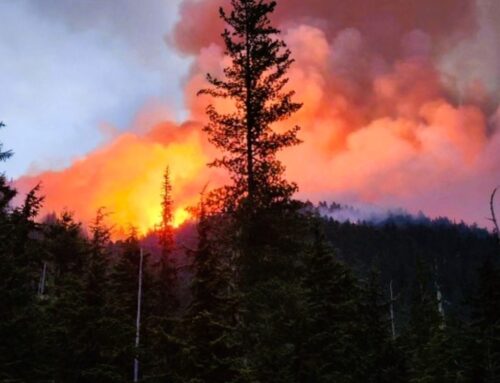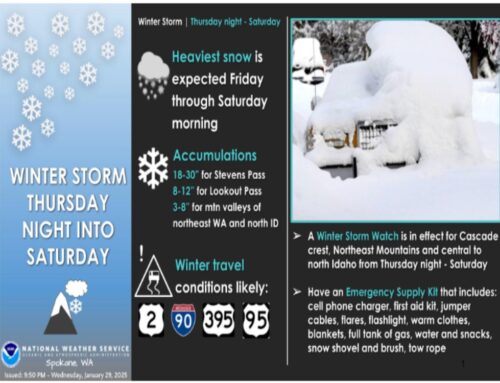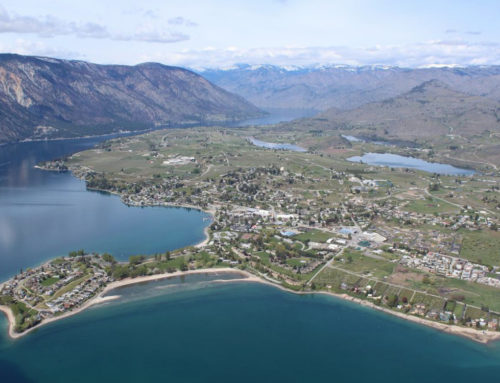Commissioner of Public Lands Discusses Fire Strategies in Chelan on June 27th
by Loni Rahm, photo above from 2015 firestorm courtesy of Inciweb
The first official day of summer, June 21st, was also the official start of fire season in our area. The Forest Service reported early on Friday morning that three small lightning-caused wildfires were burning in the Okanogan-Wenatchee National Forest from the brief thunderstorm that blew through the area the night before.
This confirms what officials from the Northwest Interagency Coordination Center (NICC) had already predicted: citing an exceptionally dry May and with a hot summer projected, they report “conditions seem to be lining up for a potentially busy fire season around much of the Pacific Northwest.”
John Saltenberger, NICC’s fire weather program manager, said there are generally between 3,000 and 5,000 fires in the Northwest each year. The Washington State Department of Natural Resources (DNR) echoes the fire season concerns and urges everyone to be extremely cautious and vigilant.
DNR records indicate that last year, 404,223 acres burned across the state, costing more than $134 million. They remind us that Washington’s “summer fire rules” are in effect April 15 through October 15 and rules apply to the 13 million acres of private and state forestlands protected from wildfire by DNR.
“Fire season is here,” said Hilary Franz, Washington’s Commissioner of Public Lands. “These hot temperatures can rob forests of moisture, setting the stage for wildfires. While we can’t do anything to stop lightning from starting fires, we all need to take special care not to spark human-caused wildfires.”
Commissioner Franz leads the Department of Natural Resources – the state’s largest wildfire fighting force and the agency responsible for preventing and fighting wildfires on 13 million acres of private, state and tribal-owned forestlands.
Town Hall Outreach Event Scheduled in Chelan on June 27th
Franz is spreading the fire-prevention message through a series of Town Hall outreach events across the state to make sure communities are prepared and engaged. Her schedule includes a stop in Chelan on Wednesday, June 27th, from 6-7:30 p.m. at the Chelan Senior Center (see poster below). No reservations are required to attend the Town Hall, however attendees are encouraged to arrive early to make sure you get a seat.
“Communities are essential to our success in fighting and reducing wildfires, and we want to engage them early and often with what we’re doing. In the face of wildfire seasons that are getting more difficult, we need to partner with each other and our neighbors if we are to overcome this great threat. I strongly urge the public to come out and learn about how we are preparing – and what they can do to help – as we go into another fire season together.” — Hilary Franz, Commissioner of Public Lands
Reminders from the US Forest Service and DNR
For those of us who live in a consistent fire zone, the cautionary reminders may seem unnecessary. But human activities continue to be the cause for four out of every five wildfires – so the restrictions and suggestions are timely.
Reminders from the US Forest Service, Okanogan-Wenatchee National Forest
- No fireworks are allowed in the national forest, please leave them at home
- No exploding targets are allowed
- Okanogan-Wenatchee National Forest firefighters have already responded to many abandoned campfires. Always, always make sure your campfire is cold to the touch before leaving your campsite.
- The safety of firefighters and the public is always the highest priority during wildfires.
- Homeowners and communities can help firefighters by creating defensible space around homes and structures.
- Unauthorized use of unmanned aircraft, also known as UAS, “drones,” or remote controlled model aircraft, in a fire area endangers the lives of pilots and firefighters. It’s not worth the view, if you fly, we can’t.
Reminders from the Department of Natural Resources
- Be aware of all fire restrictions in place
- Check with local campground hosts to make sure they allow campfires
- Build campfires only where authorized and put them completely out before leaving
- Dispose of cigarettes and other lit smoking materials appropriately and completely
- Fireworks, incendiary ammunition and exploding targets are illegal on all public lands
- When towing, be sure chains and other metal parts aren’t dragging from your vehicle or trailer. They can throw sparks and start fires.
- Be careful driving through or parking on dry grass or brush. Hot exhaust pipes can start the grass on fire. You may not even notice the fire until it’s too late.
Both agencies urge anyone who spots smoke or fire to call 911 immediately.
About Hilary Franz: Managing Working Forests for Public Benefit
More Information:
